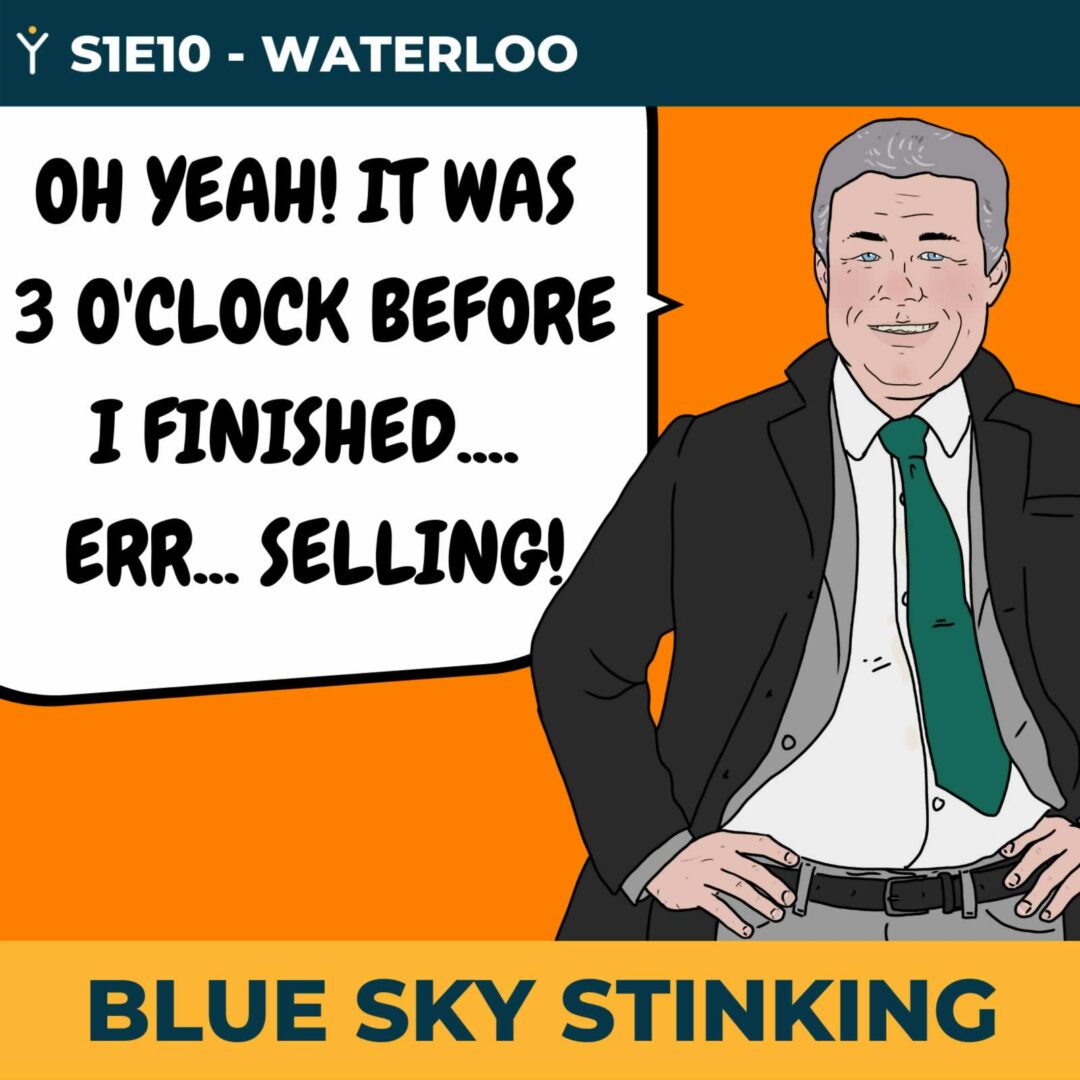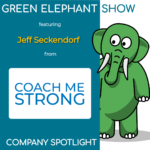
Timings
- 00:24 - Scene 10.1 - Socially Inept
- 04:00 - Scene 10.2 - That went went, not
- 06:02 - Discussion with Amanda Williams
- 08:26 - Marketing is not a dirty word
- 09:43 - Social media dangers
- 10:34 - Picking your "party"
- 11:52 - The 80/20 content rule
- 12:33 - White paper - Online harm
- 13:38 - Better social approach
- 15:48 - Closed Facebook groups
- 17:06 - Email shots and purchasing lists
- 19:06 - Due diligence
- 20:50 - Legitimate Interest... or not
- 25:30 - Digital Marketing pitfalls
- 28:46 - The Non-digital marketing mix
- 30:00 - What's missing in Sydeline?
- 31:10 - Agile marketing strategy
- 32:54 - Top tips
- 33:48 - The future for Sydeline?
- 36:01 - What's next?
Useful Information
Essential Privacy Reading (@12:33)
Top tips for compliant digital marketing(@00:00)
- Go back to the basics
- Know your customer, know your audience
- What's your tone of voice, how will you add value?
- Treat your website as your hub and use social media to attract people to it
- Keep aware of the boundaries and new regulations
- Be prepared to pivot when things change
Episode script
CONTINUITY: Montgomery Grabbar, or Monty, the Sydeline Sales Manager comes to discuss his ideas about improving sales with Zelda and Michaela.
ZELDA: Morning Monty, morning Bubbles
MICHAELA: (full of beans) Morning!
MONTY: (full of the heavy night before) Morning!
ZELDA: How was the trade show Monty?
MONTY: Hard work, loads of good contacts and great conversations.
MICHAELA: Looks like you had a long night
MONTY: Oh yeah, it was 3 o’clock before I finished… Errr…selling
ZELDA: So what’s the plan? We’re sadly lacking in sales. I have a factory producing stock and a full warehouse and an empty order book. How we going to turn this around?
MONTY: I need more leads to follow up on
MICHAELA: We are not getting the foot fall on the website. I’ve received some feedback that it’s dated, difficult to read, unclear, poorly designed… The list goes on. I’ve have 30 or so offers for website companies to do it for us – should I investigate that.
ZELDA: (sadly) I worked for hours on that website
MICHAELA: Ok, well perhaps I should focus on our social media accounts then.
ZELDA: What can we do there?
MICHAELA: Well we have Facebook, LinkedIn, Instagram, Google Plus, Tumblr, QZone, Twitter, Pintrest, Reddit, StumbleUpon, The Dots, Youtube, Horsetraders, Delicious, Viadeo, Xanga, Vine, Buzznet, Postulate, Billy Nomates, Tout, Quora, Vimeo and Medium accounts on the go. I’m monitoring messenger, SnapChat, Whatsapp, QQ, Tinder, ScribbleTalk and WeChat for customer feedback. I’ve registered us with local business organisations, networking groups, Scoot, Hotfrog, Central Index, Touch Local, Yelp and Thompson Local. I think that’s it… (Pausing to check) I’m a bit surprised we’re not generating leads.
MONTY: (tongue in cheek) What about Yellow Pages?
MICHAELA: Oh right, yep, ok – what’s Yellow Pages?
MONTY: Heh! You’re too young to understand… And good you’re monitoring Tinder
MICHAELA: Hold on, not Tinder, that’s… Errr… A mistake!
ZELDA: (a bit stunned) And you’re posting on all these services
MICHAELA: Yeah. (hurriedly) Not Tinder. It’s a bit tough keeping with the schedule as it’s about 10 hours a day
ZELDA: Wow, that’s quite an overhead for no leads
MICHAELA: Yes, and It’s having a detrimental affect on my social life
ZELDA: I bet – no wonder you didn’t join us at the pub on Friday night.
MICHAELA: Oh, I meant at the weekends
ZELDA: You’re doing 10 hours a day 7 days a week
MICHAELA: (still enthusiastic) Oh yes!
ZELDA: Right… So any ideas Monty?
MONTY: (a little bemused by social stuff) I… I think we should do an email shot. I’ve had great success with that in the past
ZELDA: Funny you should say that…I had an email the other day saying that they have 100,000 targeted contacts in an email list I could purchase for £49.99
MICHAELA: On the surface that sounds amazing…
MONTY: Sounds like a start – 1% of those and we’ll have 1000 customers in no time
MICHAELA: I’m not sure…
ZELDA: Ok, Bubbles, I’ll purchase the list and you send out and email which gets the leads flooding in.
CONTINUITY: Michaela has sent out a large chunk of the emails and has had some responses. Tapping on Zelda’s office door, Michaela needs to provide an update
MICHAELA: Zelda, would you have a moment
ZELDA: Sure, how’s it going?
MICHAELA: Well, I’m about 1/3 of the way through sending the email shot out
ZELDA: That’s taking a while.
MICHAELA: Our email service only allows us to send 100 emails at a time!
ZELDA: That means… You’ve had to do over 300 emails already.
MICHAELA: Yes, it’s a bit of a drag, but I’ve soldered on
ZELDA: Is it yielding any results?
MICHAELA: We’ve certainly had a response
ZELDA: Oh that’s good
MICHAELA: We’ve had 348 emails complaining about the mail and asking where we got the email address. About 7200 bounced as unknown emails or spam filtered. We’ve had around 10,000 unsubscribes, 480 people complaining that there wasn’t an unsubscribe option in the email and we’ve just been notified by our email service provider that our account has been blacklisted. We’ve had 18 leads from 30,000 emails and I can’t send anymore.
ZELDA: 18 leads, better than nothing I guess. When you say you can’t send any more emails… You mean today?
MICHAELA: As I understand it, permanently until we satisfy them that we resolved the illegal activity
ZELDA: Illegal?
MICHAELA: Yes, some new data protection thing… I’ve got Garth looking at it for me, but he just put his hands in his head when I showed him the email I got
ZELDA: That’s good – perhaps you could look at the law thing with him and see when we can restart the emailing
MICHAELA: Ok, sounds like a plan
Discussion Transcript
RUSSELL: Now that sounds like a horrendous state of affairs. Unfortunately, this is not uncommon in our ever-changing world of marketing and lead generation and sales. To draw out some of the learning we can take from this debacle, I’m very pleased to welcome Amanda Williams, who is a consultant with Cloud Legal. Welcome Amanda.
AMANDA: Thank you Russell, pleasure to be on your podcast.
RUSSELL: Thank you. Could you please take some time to have a look at Sideline with us. You have a unique cross section of skills in my opinion.
AMANDA: That sounds like I’m a special agent, isn’t it. I have a unique set of skills.
RUSSELL: Well, perhaps you’re special agent. [chuckles]
AMANDA: Perhaps I am.
RUSSELL: Tell us what you’re a special agent in.
AMANDA: Well, I started off my life in medical and pharmaceuticals and I’ve done about over 20 years in that. I carried the bag, I was a medical sales rep and did a little bit of marketing, and then in those days you had to choose between medical and marketing and I went down the medical route and worked in information and also clinical research, so I used to organize multinational clinical trials.
I did a lot of training as well. As you can imagine, it’s a very highly-regulated environment, lots of compliance issues. I’m an early adopter of social media. I was using Orkut in 2004, which probably people haven’t heard of. It’s a long story and it doesn’t exist anymore. I was blogging on Multiply in 2005, which also doesn’t exist anymore. When Facebook came along, it felt like a natural progression from those things.
Since I’ve been in Cornwall, I’ve run a marketing consultancy and then a few years ago I got involved in data protection, learnt about the GDPR. To me, it seems like a perfect fusion of my life. I’m an extrovert, but inside there’s a nerd trying to get out. I’ve got the marketing skills, but also that I’m very aware of the compliance and working with companies, trying and helping them get compliant with the GDPR. It’s a little bit like my clinical research skills. Evidence in compliance is a big thing in the last few years, if it isn’t evidence, it didn’t happen.
RUSSELL: An interesting balance between the market and the need to market a business and to secure the privacy of the people you’re marketing to. I think we’ve picked well for our conversation then. What has changed and has affected the world of marketing? Let’s reflect on that GDPR phrase that you’ve used a number of times. How has that affected the world of marketing?
AMANDA: I think it has affected it, and I think marketing is not a dirty word. I think some people seem to think it’s not a good thing, and I must say I love it. I love seeing adverts. I love the creativity. When I was a little girl, my dad used to– he was in sales and marketing. He played a game at parties where he’d cut the brand name out of an advert and that was my favorite game.
I love the creativity of marketing and the innovation in it, but clearly, as time has gone on, as we’ve got more technological and we’re all on Google and we’ve been tracked, things need to be regulated. It’s very different to how it was like 40 years ago where you saw an advert on a railway or something. Now, it’s following us around the internet, so I think there is a case for more regulation.
RUSSELL: Yes, you’re right about the marketing being a dirty word or it can be a dirty word. Obviously, if you’re in business, it can’t be a dirty word, not really, unless you’re fortunate enough to have people knocking on your door,
AMANDA: Yes, that doesn’t really happen does it? No, not at all.
RUSSELL: Now, you mentioned social media, and we heard in the drama Michaela rattle off an awfully long list of social media accounts she was using. What are your thoughts on that approach?
AMANDA: I think she must spend her whole day and whole night with a finger hovering over her phone, and she’s at great risk of getting RSI. I worry about that, and clearly from even from a kind of mental health point of view, it’s just not good to be on the screen that much, and a complete waste of time really, isn’t it? To have that much going on and trying to scatter that much throughout all of those social media channels. Definitely, I think some companies, there is a danger of overuse and not using it properly.
RUSSELL: Overuse is an interesting concept because people might think, “Shouldn’t I get my message out on every platform I possibly can.” How can it be overused?
AMANDA: I think it’s a question of going back to basics, and it’s finding out who are your audience and where do they hang out? If you think of social media as a party, which party are they likely to be at? It is a bit about going back to basics. Who is your customer? Where are they going to hang out? Then getting your message to them in the right way and that’s going to be different. Every business is going to be different.
RUSSELL: Yes. It’s an interesting analogy, the party concept. Considering the Facebook and Instagram, any business terms perhaps LinkedIn are the biggest parties. They’re the parties to always go to?
AMANDA: Well, they’re the parties I hang out. I like the LinkedIn party, I must admit, but that’s because I’m a nerd. I think sometimes people forget that it is social media. You and I, if you went to a party and we met, there’s a bit of small talk. I don’t go straight into a party and say, “Buy my stuff.” It is a party, there is a bit of banter with a small talk. I think that’s a really good thing.
One of the things I’ve been talking to clients about over the last few years is having a really good content plan. Roughly 80% of your content should be something that’s going to add value to your customer, maybe answering questions that they have or sharing great content with them from other people. Then you earn your annual right or 20% of that to be a good call to action to say, “Buy my stuff,” but if you’re always saying, “I’m great, come see me, buy my stuff,” it gets a bit boring and people then don’t engage.
RUSSELL: Yes. Yes, fair enough.
AMANDA: There is another side to that. It is social and it is a party if you like, but there’s a serious side to that as well, and I think we’ve seen that recently in the white paper that’s come out from the government, this online harm, so you do have to be careful. It’s not the Wild West out there. You can’t just say anything you want and there are things you have to be aware of when you’re using social media.
I would say read Jon Ronson’s book So You’ve Been Publicly Shamed, and that gives you a really good idea of how it’s so easy to get it wrong, which is why going back to basics, know your customer, know your audience, where do they hang out? Then work out what is right for you to say, what is good, what you shouldn’t say, what your tone of voice going to be and more importantly who is going to manage your social media accounts. I don’t give it to the office junior because they know how to use Twitter. That’s the idea really.
RUSSELL: [laughs] Yes, because McHale is obviously very capable with social media. It’s just– well, I’m going to talk about that in a second, I think, perhaps it’ll be a bit more strategy and thinking it through. Sideline is a startup, it’s a strange startup [laughs] I’ll grant that. [chuckles] What would be a better social approach then? Let’s be quite specific, what would be the better tack for them to take? Just focus on one social account, they’re a B2C type operation, so Facebook, is that the better social media approach? When would you start again or when would you perhaps consider some other social media accounts?
AMANDA: What I always say to my clients is, “Regard your website as the hub of your wheel. The idea of social media to drive people to your website.” It’s a way of introducing people to your brand, to your values. Maybe for a B2C brand a good place would be Facebook and Instagram, and maybe Twitter, but there’s a great saying and we’ve talked about this before, it depends.
It so depends on your brand, on your messaging, and who your audience are. Facebook is, and Instagram, a good place to start. Although the algorithms are making it harder to reach people. Mark Zuckerberg is having a little bit of a change of mind at the moment as regard to privacy issues and we don’t quite know where that’s going to go.
That’s interesting because he talked for many years about Facebook being sharing your ideas with the world, and now he’s talking about privacy and wanting it to be more like a living room, and maybe even going down the private message. For brands, that could have quite an impact on them because all of a sudden whereas even five-six years ago sharing on Facebook was easier than it is today, which is driving people to use paid social ads, or closed Facebook groups are quite good as well. I found those are very very useful. That’s more of a living room, that kind of content is more of a living room.
RUSSELL: Yes, okay. When would you use a closed Facebook [group]? What more benefits would that bring, in your thoughts?
AMANDA: I’ve got one at the moment, which is called Make Marketing Work, and there’s a couple of us on it that are experts in data protection marketing, email marketing. We’ve created a community, it’s closed, so it’s a safe space and we could really add value. It’s aimed primarily is to add value and to help people. As in all social media, if you’re a brand you want to set yourself up as the authority in your area.
By adding value, by giving great content, by sharing good posts, you can show that you’ve got your finger on the pulse. When your customer does come to choose a brand or a product or a service, hopefully, you’re the one they think of because you’ve shown them that you know your stuff and that you’re interested, you’re curious and that you got your finger on the pulse.
RUSSELL: Okay, we discussed in previous episodes and it’s our last episode that we discussed about brand and the website these Sidelines got and of course that isn’t particularly appealing either. You can go look at it. It’s pretty horrific. We heard in the first scene that the Zelda has given this permission to go out to an email short. Now bit of an old-school perhaps approach. Is it a problem of purchase list of recipients?
AMANDA: Well, it can be
[laughter]
RUSSELL: It depends.
AMANDA: It depends. Just a really good thing about email marketing is that it’s a list that you have with permission from people. It’s a little bit more stable than social media, which if Mark Zuckerberg does decide to change the rules, then you’re a little bit of a loss. You do have to take great care with email marketing and a purchase list. I would say take very, very great care.
Do your due diligence. Where’s the list come from? Has it got the right consents? Be very, very careful. The ICO are looking and they fined somebody recently for getting emails from a list. They didn’t have the right consent and they sent emails to two million people and they received a £40,000 fine. That was under the old data protection act. Now it would be more, so be very careful and do your due diligence.
Ask lots of questions. Back in the day, you would sign up for a list and it would say we will share your data with our trusted third parties, that’s not allowed anymore. You have to actually list them. If I put my name on the list, I need to know where that’s going to be shared with and I need to know the names. Then that’s a valid consent, but you do need to be very careful.
RUSSELL: Which does make it quite difficult for organizations that have previously orchestrated these lists to sell and makes a little bit tricky for them because really, they need to know who they’re going to set it [chuckles] to before they sell it, which does make it a little bit tricky. You used a phrase there, due diligence. Now, it’s a phrase that I’m obviously very familiar with, what would you say is involved in due diligence because it’s a phrase that may not be well-known to some people?
AMANDA: I would say that it involves asking an awful lot of questions from the organization and if you are going to trade with organisations, you need to know that they are playing safe with the data as well, and what preparations have they made? What evidence of compliance have they got? Because your customers will want to know that you were all playing nicely with the data. They may ask you for evidence of that and you should be able to provide it.
RUSSELL: That’s quite key. Your compliance, your business compliance and your status legally relies on the compliance of other people in that case and there’s that can you prove it is that due diligence bit, nothing is where we’ve seen a lot of people just not bothering to check where they’re getting this stuff.
AMANDA: Yes. Your supply chain. Your weakest link could make you non-compliant.
RUSSELL: Yes. People need to take their time to find [chuckles] that weakest link and either root it out or make it stronger, reinforce it. Email marketing though still has a place you feel?
AMANDA: Absolutely.
RUSSELL: Yes. Because it is difficult to market nowadays. It is actually, it’s a trickier game as you say, they keep changing the rules and it’s difficult to get to the top of the Google list and then next week on page one will be a different set of rules and it will be another density of keywords on your website and you’re all finding. Now looking slightly deeper into some of the aspects of the data protection act or GDPR.
There is a term in that which is legitimate interest and its scenic crop up in people’s privacy statement if they have one. Perhaps you give us a little bit of understanding behind the legitimate interests?
AMANDA: Okay, there are two legal basis you can use for direct marketing, consent and legitimate interest. Consent will be for people that aren’t your customers. This is for people that subscribe on your website for example that have never bought anything from you, but if they are your customers or they’ve entered into negotiations for a sale, you can send them direct marketing without their consent under legitimate interest. This is because of something called PECR, which is not the GDPR. It’s the privacy and electronic communication regulation 2003.
This has been around since 2003 and people have maybe weren’t aware of it or maybe GDPR made it sexy. I don’t know, but it has been around since 2003. You can send direct marketing without consent to your customers or to people who are entering into negotiations for sale. There is a but here, you do need to do your homework and there are a few things you need to make sure you’ve got right before you just go and send people email marketing.
If you’re going to use legitimate interest under what’s called the soft opt-in because actually, they’re kind of you’ve opted them in yourself because they are a customer. It needs to be in the course of the sale or in the course of negotiations for sale. You need to give them an opportunity to opt out at the point of that purchase. You can only send the marketing on similar goods and services and you need to always give them an opportunity to opt out.
Now a lot of ink has been spilled on legitimate interest. Some of the guidance from the ICO’s helpful in helping us think about what would the data to subject reasonably expect. Have you got a relationship with them if they’re a customer of yours, then they might reasonably expect to receive marketing on similar goods and services, but don’t forget that opt out at purchase.
That was often missing, wasn’t it before? That’s a helpful way of looking at things whereas a non-customer, you haven’t got a relationship with them, then you need to rely on consent. Last year we saw an awful lot of repermissioning emails prior to the 25th of May.
RUSSELL: Yes, It was bonkers.
AMANDA: A lot of them they didn’t really need to be repermissioned because these were customers of people. They didn’t need consent because they were customers and a lot of people lost an awful lot of emails from their email marketing list, which is a real shame.
RUSSELL: Yes. I saw one article and I really should try and dig it out again, but it said, “If you change the word legitimate to common,” and if you said, “Somebody has a common interest with you,” if you know somebody’s got a common interest, you’ll talk about that subject, but only that subject. I’d have common interests in marketing, GDPR with you. I might like Star Trek, but would I talk to you about Star Trek? Probably not, possibly not. I don’t know if you like it, therefore, I’m not sure of your common interest and therefore legitimately send you have a conversation about it. That’s great. Thanks for that explanation.
AMANDA: It’s always good as well to do your homework beforehand. Write out a legitimate interest assessment because then if the ICO were to come knocking at your door, you’ve got all your documentation to prove that you’ve really thought this through and that you haven’t just gone into it without any consideration for the privacy of the data subject.
RUSSELL: Yes. What we’ve seen here is a hundred thousand emails obviously on a list that there is no evidence of legitimate interests and no evidence of consent. Therefore, the massive fallout they’ve got and a broken email system. Moving on a little bit. What other pitfalls are there in digital marketing worth mentioning?
AMANDA: There are a few other things to be aware of. Again, it’s going back to basics actually particularly in the terms of personal data. What I always say is if you’ve got a Facebook page and you are considered a joint controller with Facebook– now, maybe that’s a discussion for another day-
RUSSELL: Yes, [chuckles] that would make it easier.
AMANDA: But just a little take-home from that is your privacy policy should be on your Facebook page. There’s a little place where you can put things like that. You can link to your privacy policy and I would also say in that section of the Facebook page, have some kind of terms and conditions about what you expect on your Facebook page.
Things like that you don’t tolerate hate speech or obscenities or whatever is right for your brand and be very careful. I think this white paper that’s just come out, I think that speaks into that. It’s a responsibility of yourself to look at your Facebook page and to monitor what’s going on in that. That’s one thing. If you’re doing influencer marketing, I think be careful with that, the ASA has really cracked down on-
RUSSELL: ASA?
AMANDA: The Advertising Standards Authority has really cracked down on influencer marketing. The celebrities that use a face cream and say how amazing it is and then they aren’t telling you that that’s because they were either giving it free or they’re paid to promote it. Just be really wary of that and check into that what you might need to put a hashtag sponsored, or a hashtag ad on that just so people know, because there’s an awful lot about transparency. The authorities want brands to be transparent with their customers.
RUSSELL: Because otherwise, I don’t think there’s anything more we know, there’s nothing more valuable than a recommendation and an unsolicited recommendation from somebody else of your services. If you’ve got a celebrity that’s promoting your face cream and they’ve been paid to do it, that’s not unsolicited and needs to be evident. That’s an interesting issue.
AMANDA: There was one more thing as well. Well, there’s lots of things, but one more thing we’ll talk about right now is just be careful with things like custom audiences on Facebook. If you’ve got your email marketing list, it’s very easy to export that and pop it into Facebook and get a custom list.
RUSSELL: Yes.
AMANDA: Just be very, very careful with that and make sure again, you’ve got the consents in the right place, Facebook are cracking down on it, and MailChimp I know have put extra steps in place. I wouldn’t advise it because, again, what you’re doing is you’re taking people’s data where they’ve agreed to have your email marketing and you’re moving it to somewhere else.
You’re moving it on to a platform that they may not be on for various reasons. You do have to make sure you’ve got that process right, that you’ve got consents in place to do that before you just go ahead and do it because it’s clever, and it does work but just because it works doesn’t mean you should do it.
RUSSELL: Just brought to my– we were talking about digital marketing specifically. I’ve also seen a rise lately in less unpolite call it junk mail. The people are moving away from the social media marketing, social media and the website marketing because it’s actually becoming a lot harder, and they’re falling back to posting stuff through your door. Have you become a cross seller?
AMANDA: Yes, I have actually.
RUSSELL: I’ve noticed that’s on the rise as well. Again, if it comes in as to occupy there’s no personal data for them to manage. It is a way of marketing without necessarily having the personal data burden.
AMANDA: In a way that is quite good to have that marketing mix. In this new era of privacy and data protection, don’t forget those traditional forms of marketing, print adverts, radio adverts. Apparently, radio adverts are on the up at the moment.
RUSSELL: Are they coming back again? [chuckles]
AMANDA: They are and the catalogs, and I must say there’s a little bit of me that actually is quite enjoying getting some of the catalogs back and just physically flicking through away from screen time. Don’t discount all those traditional forms of marketing.
RUSSELL: That brings us nicely on to what is missing in Sideline? In your opinion?
AMANDA: I think Sideline need to go back to basics. They need to ask who their audience are. They need to have a strategy and a plan and maybe have some idea about what sort of content they’re going to produce, how are they going to do it? Who’s going to do it? Then look at the data they have got and do an audit on it. That’s something that we always recommend and if that’s something that you talk about a lot, too.
Whose personal data you’re holding, have you got a legal reason to hold it? If you haven’t, then you need to get rid of it. Decide what you can and can’t do with that data. Then you may need to get somebody to help you with your social media marketing, as I say don’t necessarily just leave it to the junior because they know how to use Instagram and they know what a hashtag is because it can spiral out of control. If you haven’t got someone that understands your tone of voice and the kind of boundaries in which you operate.
RUSSELL: Thank you. Strategies are always one of those dirty words. Many businesses are now, don’t do strategies, they haven’t got time for it or they can’t see the value in it, but part of it is about what’s your ethos? What’s your values? Where are you trying to go? Where’s your marketplace? Getting that down doesn’t have to be a tome, doesn’t have to be anything much more than two sides of a four sort of thing, but how are you then going to address that market? How are you going to get it? I think it needs to be understood from the top down, doesn’t it?
AMANDA: Yes.
RUSSELL: Because Zelda didn’t know the impact of sending out this email. She took no advice. I think that’s always a problem is if somebody’s making a decision on a marketing strategy, without considering the impacts of it.
AMANDA: I think also you can have your two sides and it can be agile because things do change. Mark Zuckerberg is changing his mind on how Facebook is going to run. The algorithms on Instagram have changed and then you find that your engagements gone down. Sometimes you do need to be prepared to pivot a little or react to something. A strategy can be great. It doesn’t have to be absolutely set in stone.
Be prepared to roll with the changes a little bit. Also keep your eye on new regulations coming up. We got a privacy that will come up one day, that’s another subject for another day, I’m sure. There are lots of things that you need to be aware of, when you’re doing marketing of any sort.
RUSSELL: As we approach the end of our conversation in terms of social media and digital marketing, and you probably said some of these before, but what would be the top tips that people could take away from our conversation?
AMANDA: I think what I’m saying my top tips to sum up are go back to basics on all sorts of things. Who are your audience? Where are they? What’s your tone of voice? What sort of things are you going to share with them? How are you going to add value? Don’t forget it’s social media, but then it’s also there’s a tension between that and given actually getting it wrong as well. Just be aware of the boundaries and be prepared to learn from new regulation and be prepared to pivot when things change.
RUSSELL: Brilliant. Now I will put some links to the white paper you mentioned and the book you mentioned on our show page. Before we go, what do you see in the future for Sideline [chuckles] in this situation?
AMANDA: I think they got some work to do, don’t they? I think they need to have a big long coffee break and have a good old chat about exactly what they’re trying to achieve, who their customer is, and how they’re going to get there and all work together. Because I think sometimes you can, one person wants to go one way and because the other person doesn’t know what they’re doing, it’s easy for it to get out of control. I think they need to sit down, have a big coffee break.
RUSSELL: I think that’s quite a good general tip, isn’t it? Is take the time to think things through and to take advice. Find somebody who you trust or who is skilled in a particular area and take advice on it. I think it’s so easy for a business especially small business, they kick off and they start producing what they’ve always done and they doing the delivery, delivery, delivery but they don’t necessarily think and spend time to go back.
Are we heading in the right direction? Are we doing it right? Have we got all of the legal requirements covered? Yes, that getting back to basics tip that you had, is invaluable. Thank you very much Amanda.
AMANDA: It’s a pleasure.
RUSSELL: It’s been a great conversation and I think as you say this is a subject as with many that we’ve covered that there’s got so many tendrils going into the business, but data privacy and personal data is something that is incredibly important and it certainly got a very strong law, several laws to back it up now.
All I can do now is having thank you is to encourage everyone to have a listen to the other podcasts and to comment and like and share and tell your friends and ask questions and give us ideas of what we can do with Sideline in the future. If you’ve got any experiences yourself, please, do take time to leave those. Next time, we’re looking at little bit further into compliance issues, and specifically, a bit of respect. Join us next time for I do, I do, I do, I do, I do.
with special thanks to...
Amanda Williams is a consultant with Cloud Legal. A Hybrid Marketer and Privacy Professional & Trainer, Amanda has a unique perspective on balancing the desire to market a business effectively with the need of complying with privacy laws.









